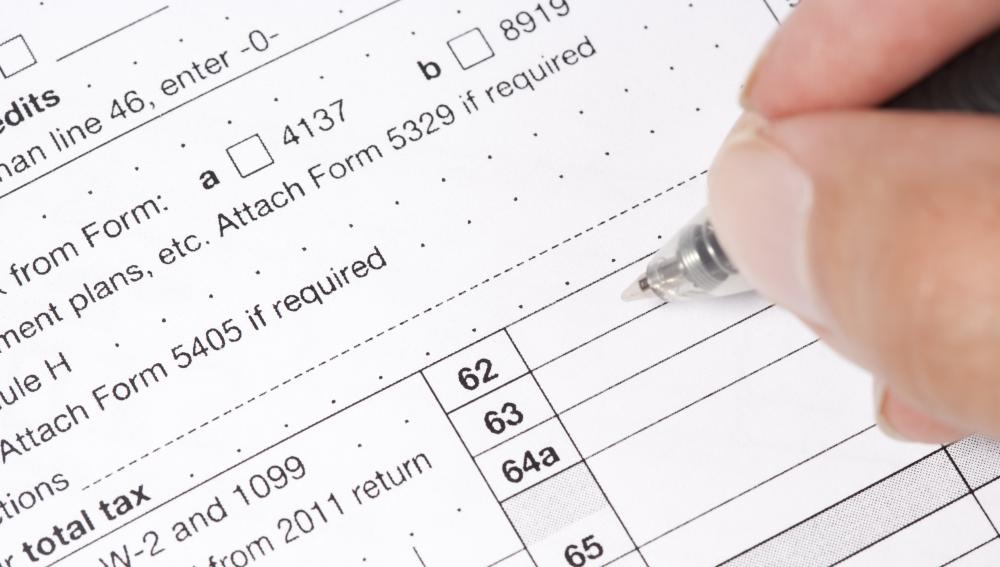At WiseGEEK, we're committed to delivering accurate, trustworthy information. Our expert-authored content is rigorously fact-checked and sourced from credible authorities. Discover how we uphold the highest standards in providing you with reliable knowledge.
What is Estimated Tax?
Estimated tax is the amount of tax that an entity expects to pay on generated income during the upcoming tax year. Individuals who work as independent contractors as well as business owners of all types are responsible for accurately projecting the amount of the taxes and arranging appropriate payments to the tax agency during the course of the calendar year. The specific processes for calculating and paying this estimated tax vary from one country to another, making it necessary to refer to guidelines issued by the tax regulating agency in the country where the individual or business resides.
In the United States, the process of calculating estimated tax is relatively straightforward, especially for small business owners and individuals who make a living as freelancers. Essentially, the entity looks closely at the total revenue generated during the previous tax year. Using a specific form supplied by the Internal Revenue Agency, the entity calculates the estimated exemptions and other factors, ultimately arriving at a likely amount of the revenue that is subject to taxation. By consulting a tax table provided by the IRS, it is possible to determine the annual amount of tax due, assuming that the entity takes in at least the same amount of revenue in the upcoming tax year.

The US model also requires that a portion of the estimated tax be paid on a quarterly basis. To this end, the IRS provides simple quarterly forms that can be sent along with one-fourth of the total amount of tax estimated for the year. Savvy business owners usually pay close attention to the actual amount of income generated for each quarter, and adjust the amount of tax reported accordingly. This approach helps to ensure there is no substantial amount of taxes due that remain outstanding when the annual return is prepared, and allows the taxpayer to avoid any type of penalties.

Other countries use similar methods for calculating the estimated tax amount on projected income. While a quarterly tax model is very common, there are some countries where it is possible to pay the entire annual projection at one time, thus avoiding the need to make quarterly payments. Other countries require adjustments based on capital gains and other factors, and impose strict penalties for failing to make these adjustments in a timely manner.
Paying estimated taxes throughout the year has several benefits for people who are self-employed. First, quarterly payments help to prevent owing a huge tax debt at the time the annual return is filed. The quarterly payments also minimize the chances of having to pay penalties due to owing a significant amount at the time of the annual return. Since most countries use simple methods to calculate annual estimated taxes, it is a simple process to prepare the necessary forms and send in the funds by the due date associated with each quarterly payment, and thus keep the financial records in proper order.
AS FEATURED ON:
AS FEATURED ON:












Discussion Comments
@Vinzenzo -- Great points and I would go one further by suggesting that anyone setting up a business should consult with an accountant when cash starts rolling in. More than one business has been ruined by poor tax planning.
I would let that accountant take care of estimated taxes, too. The last thing you want to do is not be able to meet your tax burden. Once that happens, you will have the IRS crawling all over your affairs for years. Yuck.
A huge mistake by a lot of business owners is to blow through their income and not sock anything away for taxes. That hurts a lot of small businesses during the first year they are in operation because their owners don't really think so much about taxes.
Some advice? Set about 25 percent of your income aside during that first year to be sure you will be able to meet your tax burden and then rely on withholding estimated taxes after that.
One of the great things about estimated taxes is they effectively force business owners to consider their tax burdens and keep enough money on hand to meet them. The first year in business can be rough, but estimated taxes make it easier to manage money so enough is left over for the government.
Post your comments